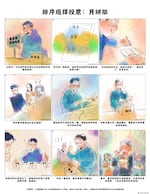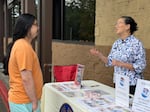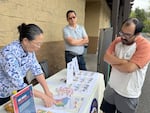
Tommy Ly poses inside his gift store Stumptown Otaku in downtown Portland, Ore., on Sept. 16, 2024.
Winston Szeto / OPB
Editor’s note: Election Day is Tuesday, Nov. 5. Stay informed with OPB on the presidential race, key congressional battles and other local contests and ballot measures in Oregon and Southwest Washington at opb.org/elections.
Tommy Ly immigrated to the United States from Vietnam with his family in the ‘90s, and they became citizens about a decade later. When he looks at the pamphlets and websites explaining Portland’s new ranked-choice voting system, he’s reminded of the challenges his parents faced voting in their first American election in 2008.
“My mom got really confused — the ballot was all in English and she doesn’t even know how to do it,” he said. “If I see the way my mom struggled, I’m pretty sure the auntie down the street, the grandma on 82nd (Avenue) … they would have the same problem or even worse a problem — they probably would just throw the ballot away.”
Having grown up in a Chinese-speaking household, Ly sympathizes with the frustration many Chinese seniors feel trying to understand the ranked-choice voting system, which will be used for the first time this year to elect Portland’s new mayor, city auditor, and 12 councilors from four newly established districts.
Related: Portland is overhauling its voting system and government structure. Here’s what you need to know
Ranked-choice voting is already considered the most complex and significant change to Portland’s voting system, even for native English speakers. For the city’s Chinese-speaking population, estimated at over 10,000 in Multnomah County, the challenge is even greater. The 2023 American Community Survey shows that nearly 60% of these residents have limited English proficiency, making it harder for them to navigate the process.
To help, Ly volunteers with the Chinese American Citizens Alliance, or CACA, a nonpartisan nonprofit that promotes civic engagement among Chinese immigrants. He also runs a small business in downtown Portland selling Japanese pop culture collectibles.
Last month, while brainstorming with fellow volunteers on how to simplify the ranked-choice voting process for the Chinese community, Ly had the idea to create a manga-style comic strip. He compared the voting process to choosing mooncakes, a traditional food familiar to most Chinese people. After completing the comic in English, his team translated it into Chinese.
“Instead of picking one flavor, you get to rank them from your favorite to least favorite. If no flavor gets enough votes to win outright, the least popular flavor gets eliminated.
Related: What you need to know about voting in Oregon and Southwest Washington
“Then, if your top pick was the one eliminated, your vote automatically moves to your next favorite flavor. Then keep doing this until one flavor has the most votes and wins!” Ly explained in the captions beneath the nine panels of the 8.5-by-11-inch comic, which he completed in two days using a mix of watercolor and digital illustration.
Two weeks later, Ly expanded on the idea with a 16-panel comic strip. This time, he used bubble tea flavors and toppings to explain how ranked-choice voting works in both single-winner races (for mayor and city auditor) and multi-winner races (for councilors).

Tommy Ly's nine-panel comic strip, in Traditional Chinese, compares ranked-choice voting to selecting mooncake flavors.
Courtesy of Stumptown Otaku
Official information ‘confusing’
Comics have always been a passion for Ly. As a child, he would beg his father to take him to a Chinese bookstore in Portland’s Chinatown so he could buy his favorite Hong Kong comic series, Old Master Q. His interest continued through high school, where he took animation classes. After leaving the U.S. Navy, he attended the now-closed Art Institute of Portland to further develop his comic drawing skills.
Ly describes himself as a visual learner and finds it challenging to read lengthy Chinese texts. So when he came across Portland’s official Chinese translations of the ranked-choice voting materials, which he felt were written in archaic terms, he was unimpressed.
“I feel like reading that is actually a lot more confusing than it needs to be,” he said. “They use terms that (don’t) make sense.”
Ly’s critique highlights a broader issue for Oregon counties that translate election materials into various languages. In Multnomah County, where Chinese and Vietnamese are common, the growing Asian voter population has drawn more attention to these concerns.
Recognizing the need to assist this expanding voter base, Judy Lee and other CACA volunteers will staff voter registration booths around Portland through Oct. 15, the state’s registration deadline, to encourage people to participate in the upcoming election.
Just before the Moon Festival in mid-September, Lee set up a table in front of an Asian grocery store in Beaverton. Equipped with paper copies of Ly’s comic strip that she had helped translate into Chinese, she explained ranked-choice voting to shoppers in both Mandarin and English, drawing attention with the colorful artwork.
“Kids are definitely interested — I think the great thing is that if you bring in the kids, the parents are the one that follows.
“I really like the idea of using comic strips to attract different groups of audience,” Lee said. “For the seniors, being that it’s graphic is also easier to understand.”

Judy Lee stands behind a voter registration booth organized by the Chinese American Citizens Alliance outside of 99 Ranch Market in Beaverton, Ore., on Sept. 15, 2024.
Winston Szeto / OPB
As the daughter of Taiwanese immigrants, Lee understands the struggles first- and second-generation Asian Americans face when their parents can’t vote due to language barriers. She hopes that in addition to translating voter pamphlets, ballots themselves will also be translated in the future.
“Because very often when people are not comfortable, they just choose not to participate — they don’t want to be embarrassed, they also may be scared, ‘Oh, am I making a not-informed decision?’” she said.
For better Asian American representation
This sentiment was echoed in the 2024 Asian American Voter Survey, conducted by nonprofits such as APIAVote and Asian Americans Advancing Justice. The survey found that a majority of Asian American voters across the country believe translations of ballots and explanatory information should be available at polls for those with limited English proficiency.
CACA Portland Vice President Gloria Lee, whose group isn’t involved in the survey, says her organization will hold a ballot translation event on Oct. 26 at the Asian Health & Service Center in Southeast Portland. Volunteer translators will help Chinese seniors fill out their mail-in ballots, just as they assisted around 120 seniors during the last election.
Related: Issues important to Oregon voters
Lee sees Ly’s comic strips as a fun way to introduce ranked-choice voting to seniors. “I hope that continues, and I hope that the communities of color have better representation, but it will only happen if we get involved.”
Back at his store in downtown Portland, Ly is brainstorming ideas for future comic strips that showcase food items from various cultures to help explain ranked-choice voting. He’s also seeking volunteers to translate these comics into more languages.
In an emailed statement to OPB, Elections Division Manager Deborah Scroggin of the city of Portland applauded Ly for the comic strip, but emphasized that voters should only select candidates they actively support, rather than those they feel neutral about or dislike.
The city auditor’s office is planning to evaluate the accessibility of election materials and the quality of their translations. They are seeking public input and encouraging feedback via email at elections@portlandoregon.gov.

Judy Lee stands behind a voter registration booth organized by the Chinese American Citizens Alliance outside of 99 Ranch Market in Beaverton, Ore., on Sept. 15, 2024. Tommy Ly's comic strips are displayed on the booth table.
Winston Szeto / OPB


